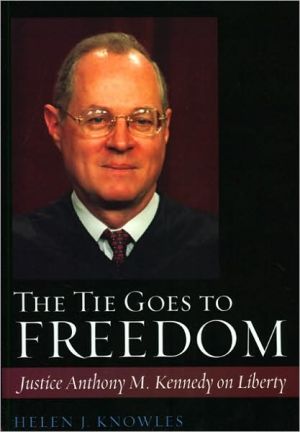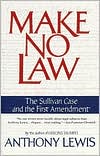The Tie Goes to Freedom: Justice Anthony M. Kennedy on Liberty
At the ideological center of the Supreme Court sits Anthony M. Kennedy, whose pivotal role on the Rehnquist Court is only expected to grow in importance now that he is the lone "swing Justice" on the Roberts Court. The Ties Goes to Freedom is the first book-length analysis of Kennedy, and it challenges the conventional wisdom that his jurisprudence is inconsistent and incoherent. Using the hot-button issues of privacy rights, race, and free speech, this book demonstrates how Kennedy...
Search in google:
This is the first book-length analysis of Supreme Court Justice Anthony M. Kennedy. Using the hot-button issues of privacy rights, race, and free speech, The Tie Goes to Freedom challenges the conventional wisdom that Kennedy's jurisprudence is inconsistent and incoherent. The book also demonstrates how he forcefully articulates a libertarian constitutional vision. Publishers Weekly While billions of dollars have gone toward researching treatments, and ultimately a cure, for breast cancer, very little has gone toward studying preventative action, except on the personal level (diet, exercise, etc.). This eye-opening book from health and sociology scholar McCormick explores numerous environmental causes of breast cancer, but more importantly casts a harsh light on the motivations of industries that donate to cancer research while manufacturing carcinogenic toxins. The narrative takes a tour of research data and advocacy groups while following the progress of one Long Island woman undergoing breast cancer treatment. McCormick's text is full of disturbing details, in the form of statistics and individual obstacles; there are thousands of breast cancer diagnoses every year, many for women who take good care of themselves and don't engage in risk behaviors. McCormick also addresses the inevitable question, "Why me?", with a compelling and strident determinism, attempting to jog readers into realizing that giving money and buying products with pink ribbons isn't enough; rather, people must become aware of the chemicals around them and hold corporations accountable with their spending dollars. Copyright © Reed Business Information, a division of Reed Elsevier Inc. All rights reserved.
Chapter 1 Introduction. Shall We Call It the Kennedy Court? Chapter 2 Chapter 1. Justice Kennedy, On Liberty Chapter 3 Chapter 2. "Speech Is the Beginnng of Thought" Chapter 4 Chapter 3. If Rational Basis Means Anything . . . Chapter 5 Chapter 4. When Only Strict Scrutiny Will Do Chapter 6 Chapter 5. Liberty, Exercised Responsibly Chapter 7 Conclusion. "It all depends on Justice Kennedy"
\ Harvard Journal Of Law and Public PolicyHelen Knowles has done us a great service in deconstructing Justice Kennedy's faint-hearted libertarianism and helping us better understand the "sweet mystery" of his jurisprudence.\ — Ilya Shapiro\ \ \ \ \ Law and Politics Book ReviewKnowles presents an impressive discussion of several cases. Another strength of this work is Knowles' ability to buttress her arguments between and among chapters... forming clear connections throughout the book. Knowles' work packs a punch and could be considered required reading for any number of undergraduate and graduate courses. This book is one of the more interesting and well written books that I have read in recent years.\ — Tobias Gibson, Monmouth College\ \ \ Political Science Quarterly.... [offers] an insightful and careful analysis of [Kennedy's] opinions in important areas of constitutional law. Moreover, in her analysis of those opinions, she does uncover some themes that help explain Kennedy's outcomes. And because Kennedy does, in fact, remain the "man in the middle," it is essential for those of us who care about constitutional law to understand his thinking, whatever it might be.\ — Geoffrey R. Stone, The University of Chicago Law School\ \ \ \ \ The Federal LawyerThe Tie Goes to Freedom is a...book of...interest to academicians....Knowles’ introduction and conclusion are clear and succinct.\ \ \ \ \ TrialIf one does not have preconceived notions regarding Kennedy, it is hard not to admire him after reading this book. The cases Knowles selects cast Kennedy, who often acts as a swing vote, in a golden light— as a passionate fighter for individual rights, equality, and tolerance. Kennedy's supporters and critics will find the analysis of the justice's jurisprudence provoking; the book, however, has much more to offer than a simple review of case law.... The Ties Goes to Freedom will appeal to readers for these and other intriguing issues that lurk just beneath the surface of Knowles's analysis.\ \ \ \ \ Publishers WeeklyWhile billions of dollars have gone toward researching treatments, and ultimately a cure, for breast cancer, very little has gone toward studying preventative action, except on the personal level (diet, exercise, etc.). This eye-opening book from health and sociology scholar McCormick explores numerous environmental causes of breast cancer, but more importantly casts a harsh light on the motivations of industries that donate to cancer research while manufacturing carcinogenic toxins. The narrative takes a tour of research data and advocacy groups while following the progress of one Long Island woman undergoing breast cancer treatment. McCormick's text is full of disturbing details, in the form of statistics and individual obstacles; there are thousands of breast cancer diagnoses every year, many for women who take good care of themselves and don't engage in risk behaviors. McCormick also addresses the inevitable question, "Why me?", with a compelling and strident determinism, attempting to jog readers into realizing that giving money and buying products with pink ribbons isn't enough; rather, people must become aware of the chemicals around them and hold corporations accountable with their spending dollars. \ Copyright © Reed Business Information, a division of Reed Elsevier Inc. All rights reserved.\ \ \ \ \ Library JournalKnowles (political science, SUNY-Oswego) has written a philosophical treatment of Justice Kennedy's tenure (so far) on the Supreme Court. When Kennedy was appointed in 1987, he was hailed and criticized as a strong conservative. Over time, he has become controversial as a moderate voice and is now considered to be a pivotal vote on the Court. The author weaves a discussion of Kennedy's background as a law student and classroom teacher with an examination of how this has influenced his judicial philosophy. The beginning of the book examines his judicial thought in the context of libertarian thought. However, Knowles does not call the justice a libertarian. Instead, she uses libertarian philosophy to show that Kennedy is a believer in small government and individual liberty. Each chapter looks at Kennedy's views on issues such as affirmative action, civil rights, and free speech by discussing the level of judicial scrutiny applied to them. This is an extensive, thought-provoking look at judicial decision making that tackles complex issues. Recommended for law and academic libraries.\ —Becky Kennedy\ \ \








